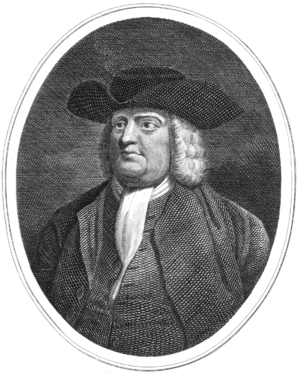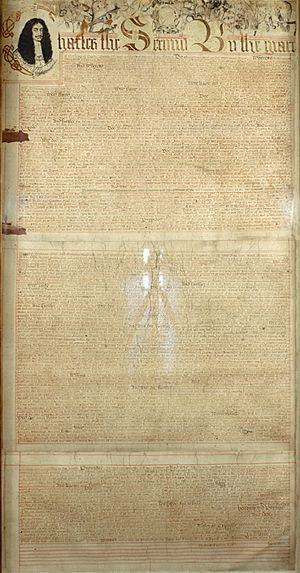Nationality law in the American Colonies facts for kids
Nationality law in the American colonies was about how people became citizens or "subjects" before the United States became its own country. Each colony had its own ideas, but they also followed rules from England. This was a complicated time as they tried to figure out who belonged and what rights they had.
Contents
Who Was a Citizen? England vs. Colonies
In England, the law said that anyone born in England, or whose parents were English, was automatically a subject of the King. This idea is called jus sanguinis, which means "right of blood."
But what about people who weren't English, like Germans or Dutch settlers? It was much harder for them to become full subjects and get the same rights. This process was called naturalization.
The main rules connecting England and the colonies were in documents called colonial charters. These charters sometimes said that non-English settlers would eventually become "Loving subjects" of the King. But it wasn't clear if the colonies themselves could make people citizens, or if only the English Parliament in London could. This led to different laws being made in England and in the colonies, which sometimes caused problems.
How England Made People Citizens
England had a few ways for people to become subjects:
Private Naturalization by Parliament
The best way to become a subject was through a special law passed by the English Parliament. This was very expensive, costing a lot of money in the 1670s. It was also very exclusive. For example, it was designed to keep Catholics from becoming subjects, and it also limited other non-Christians.
Royal Denization
Another option was royal denization. This was easier to get and made someone a permanent resident, but it didn't give them all the same rights as a natural-born English subject.
Early English laws about who could become a subject were very strict. This was partly because of religious prejudice, fear of foreigners, and a desire to protect the business advantages of English people. Parliament wanted to control who came into the colonies.
However, things started to change. In 1663, the Linen Cloth Act made it a bit easier for certain foreigners who could help the country, like those who worked with linen.
The First General Naturalization Law
The first general law that made it simpler to become a subject was the Foreign Protestants Naturalization Act 1708. This law required people to promise loyalty to the King and declare they were Protestant. It also made the application fee very low, just one shilling.
However, a political group in England called the Tories didn't like open immigration. So, this law was canceled in 1712, but people who had already become subjects under it kept their status.
Why England Changed Its Mind
The colonies really needed more people, especially farmers, to grow and develop. Many groups wanted more immigration, including the King, landowners, and colonial governments. They saw it as a way to make money, settle new lands, and protect the colonies from other European powers like Spain and France.
Colonial governments started working hard to attract immigrants. In 1740, the English Parliament passed a new, more open law that made it much easier for foreigners in the American colonies to become British subjects.

The Plantation Act of 1740
The Plantation Act 1740 was a big change. Before this, foreigners in the colonies had to travel all the way to London to ask Parliament to become a subject, which was expensive and took a long time.
After 1740, foreigners could apply for naturalization right in the colonies. They just needed to have lived there for seven years without leaving for more than two months at a time. This law applied to all of British America. The application fee was capped at two shillings, and applicants had to promise loyalty to the King and declare they were Protestant in court.
While the law still favored Protestants, it made exceptions for Quakers, Jews, and later, Moravians. This meant some non-Protestants could become subjects. Even if one colony was strict, foreigners could go to a more welcoming colony to apply. For example, Rhode Island, New York, and Georgia made it easier for Jewish applicants, and many Jews settled there.
Even though the Plantation Act had strict rules, many colonies didn't always follow them perfectly. Some colonies even made their own naturalization laws that went against Parliament's rules. This continued until 1773, when Parliament finally told all colonial governors to stop approving any local naturalization laws. By 1773, over 6,900 foreigners had become subjects under the 1740 Act, with most of them doing so in Pennsylvania.
How the Colonies Made People Citizens
Almost all colonies, except New Hampshire, created their own naturalization rules. They believed they had the right to do this, even though their royal charters didn't specifically say so.
Before 1700, colonies often passed special laws to naturalize specific groups of people. After 1700, England started to limit these local powers. For example, the Act of Settlement 1701 in Britain said that naturalized subjects couldn't hold high political office. It wasn't clear if this rule applied to the colonies, so some colonies kept allowing it. Even when England threatened to challenge them, the colonies continued to make their own laws to attract new immigrants until 1773.
Colonial laws were more limited than Parliament's. A colony could only grant rights that applied within its own borders.
Different Rules in Different Colonies
Naturalization rules varied a lot between different parts of the colonies:
- New England: These colonies had stricter rules. For example, in the early 1700s, Massachusetts required ships to provide passenger lists and later banned poor or sick people. Connecticut made all newcomers take an oath of loyalty. New Hampshire didn't make any naturalization laws, but some foreigners still settled there and were accepted.
- Mid-Atlantic and Southern Colonies: These colonies were more open.
* Virginia encouraged new people to settle there. * South Carolina attracted foreigners by giving them the same rights as English-born people and even protecting them from old debts. This made it a safe place for people struggling with debt in England. * New York made its naturalization process easier in 1730 because it had many foreign Protestants and wanted to expand westward. * Pennsylvania passed its own general naturalization law in 1742, giving full rights to foreigners who had lived there for less than the seven years required by the 1740 Parliamentary Act. Even though Parliament later canceled Pennsylvania's general law, the state continued to use special laws to naturalize people because it also wanted to expand.
Both New York and Pennsylvania also made an important change: they allowed people who had religious reasons for not taking oaths, like Quakers, to skip the loyalty oath during naturalization. This idea later influenced England's general naturalization law.
Even though colonial naturalization laws gave different political rights, they generally gave foreigners the right to own land. Owning land was often important for being able to vote, either for themselves or for their children born in the colonies.
After the Revolution: Before the Constitution
As the colonies moved closer to breaking away from Britain, people started to believe that foreigners who worked hard and contributed to the community deserved the same rights as everyone else. Americans valued immigrants' contributions. This led to a new idea: that everyone should have equal rights, no matter where they came from. The United States Declaration of Independence even mentioned that King George III had tried to stop foreigners from becoming citizens.
After the American Revolution, under the Articles of Confederation, each new state could make its own naturalization laws. However, a person naturalized in one state would have the same citizenship rights in all other states. This meant that different states had different rules and requirements for becoming a citizen. But they all agreed on some things, like needing to promise loyalty and live in the state for a certain period before becoming a citizen.
Eventually, the U.S. Constitution was written to create more consistent laws across the country. It gave Congress the power to create a "uniform rule of naturalization" in Article I, section 8, clause 4. This allowed the United States to create its own national citizenship laws.
 | Calvin Brent |
 | Walter T. Bailey |
 | Martha Cassell Thompson |
 | Alberta Jeannette Cassell |


